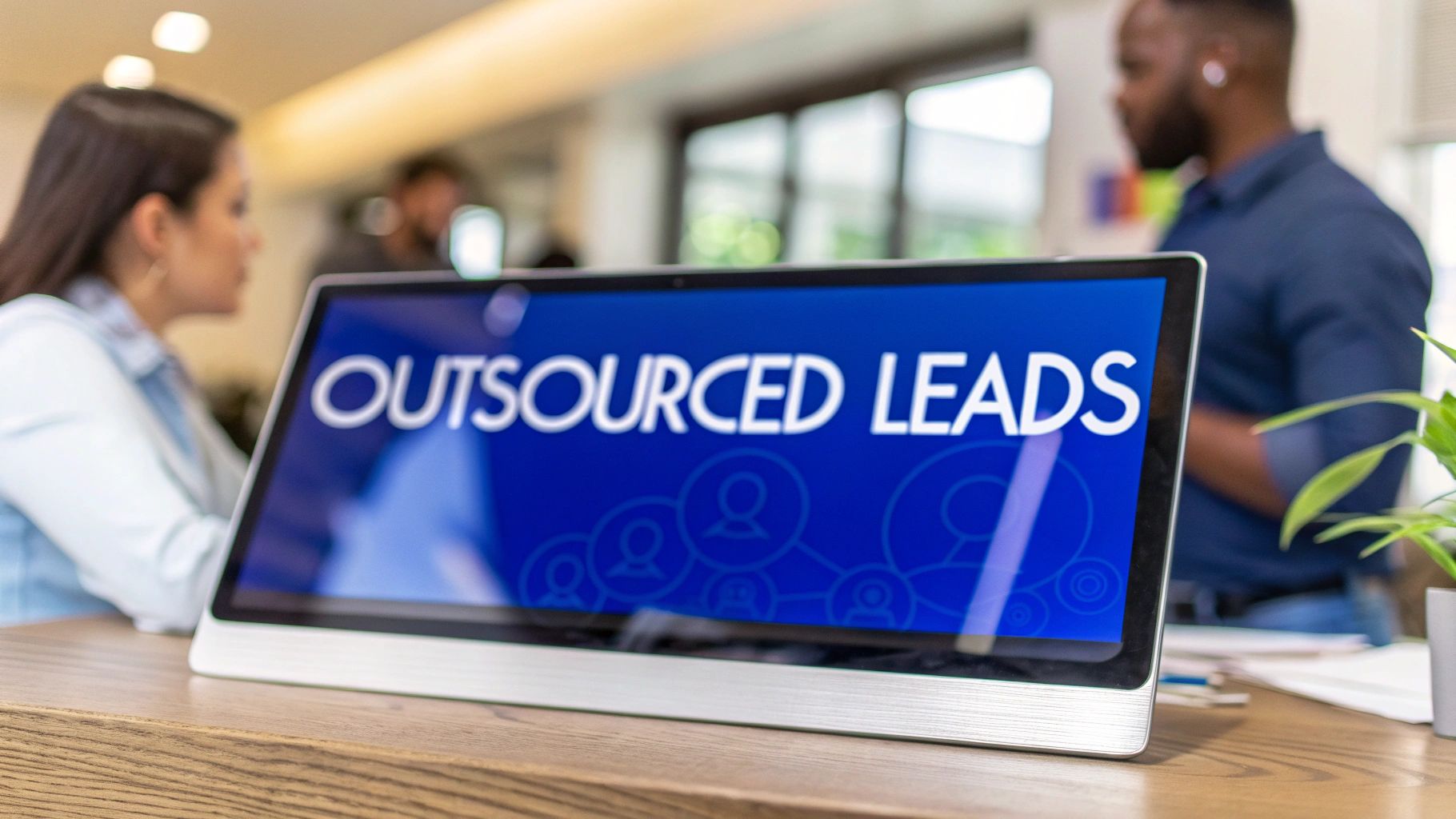At its core, outsourced lead generation means bringing in a specialist agency to handle the crucial task of finding, engaging, and qualifying potential customers for your business.
Think of it like hiring a master craftsperson to build the engine for your sales machine. While you focus on steering the vehicle and closing deals, they're in the workshop, meticulously engineering the fuel injection system—your lead pipeline—to ensure it runs smoothly and efficiently. This kind of strategic partnership has become a go-to for UK businesses serious about scalable growth.
What Does Outsourced Lead Generation Actually Involve?
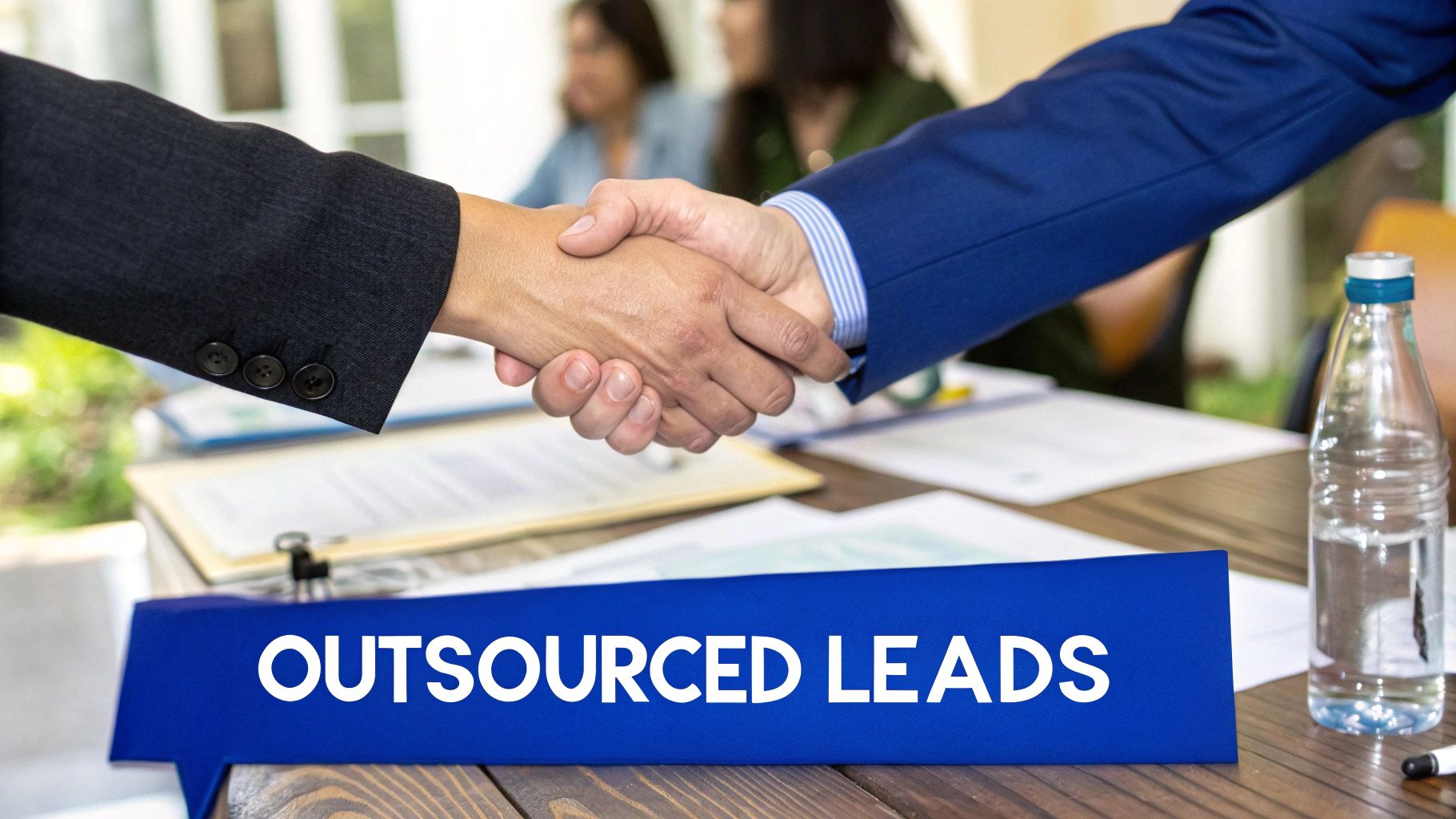
Every business needs a constant flow of high-quality fuel—in this case, qualified leads—to keep the sales engine running. Outsourcing this part of the process means you’re delegating the entire fuel-sourcing operation to a team of dedicated experts.
This is far more than just a list of names and numbers. A modern outsourced partnership manages a whole host of activities designed to fill your pipeline with prospects who are genuinely interested in what you have to offer. It's a popular move, too. It’s estimated that by 2025, around 48% of UK businesses will be outsourcing at least one part of their sales process, a clear sign of its growing importance.
The Partnership Model In Action
It all starts with a deep dive into your business. The agency first works with you to pin down your Ideal Customer Profile (ICP)—a crystal-clear picture of the exact company you want to sell to. Getting this foundational step right ensures every single outreach effort is aimed squarely at the right audience.
Once the ICP is locked in, the agency does the heavy lifting:
- Building Targeted Lists: They use sophisticated tools and databases to create highly specific lists of potential customers that perfectly match your ICP.
- Crafting the Campaign: Their experts design personalised messaging and multi-channel outreach strategies, typically blending email, LinkedIn, and well-timed calls.
- Execution and Nurturing: The agency launches the campaigns, engages with prospects, and warms up any initial interest until a lead is fully qualified and ready to be handed over to your sales team.
The real magic of an outsourced lead generation partner is their specialisation. They live and breathe this work every day, bringing a level of focus, technology, and refined process that's incredibly difficult and expensive to build from scratch in-house.
For anyone looking to build a robust sales pipeline, this approach offers a structured and expert-driven path forward. For a closer look at what makes these campaigns tick, A Guide to Outsourced Lead Generation Success offers some brilliant insights. Ultimately, this partnership turns lead generation from a time-draining internal chore into a predictable, scalable system managed by seasoned professionals.
Key Differences: In-House vs Outsourced Lead Generation
Deciding between building an internal team and partnering with an agency is a common crossroads. Each path has its own distinct set of advantages and challenges, and the right choice often depends on your company's stage, resources, and growth ambitions.
Here’s a straightforward comparison to help clarify the main differences:
While an in-house team gives you direct control, an outsourced agency provides immediate expertise, speed, and scalability. Understanding these trade-offs is the first step toward making an informed decision that aligns with your business goals.
So, What Are the Real Perks of Outsourcing Lead Gen?
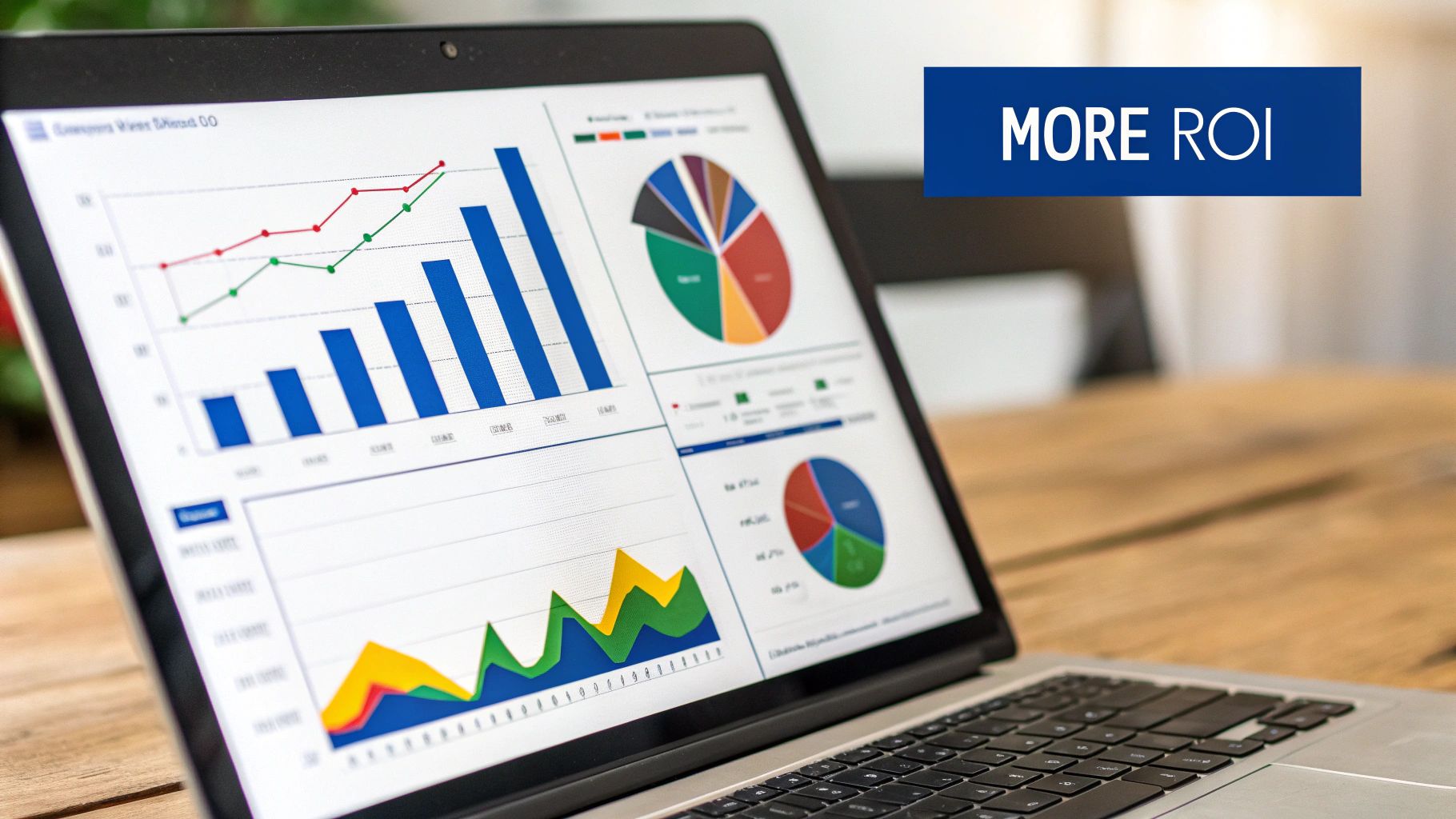
Handing over your lead generation to a specialist agency is about much more than just getting a list of names. It’s a strategic move that can ripple through your entire sales operation, fundamentally changing how your business finds new customers and grows.
One of the first things you'll notice is just how cost-effective it is. Think about what it takes to build a lead gen team from scratch: recruitment fees, salaries, benefits, not to mention the constant investment in training and the latest software. Outsourcing lets you tap into a whole team of pros for a fraction of that cost.
This is a massive piece of the puzzle when you're mapping out your growth. If you're weighing up where to put your money for the best return, our guide on outsourcing digital marketing offers some solid insights on making your budget work smarter.
Tapping into Niche Skills and Top-Tier Tech
When you bring in an external agency, you’re getting a team that lives and breathes lead generation. These aren't just general marketers; they're specialists. You get data analysts who can zero in on your perfect customer profile and copywriters who know how to craft an email that actually gets a response. They've run hundreds of campaigns and have honed their methods down to a fine art.
Behind these experts is a seriously powerful tech stack. Agencies invest in the best-in-class data tools, automation platforms, and analytics software—the kind of gear that would cost a small fortune for a single company to buy and manage on its own.
Think of it this way: you’re not just hiring a service, you’re plugging into a fully-built, high-performance lead generation machine. It's already been tuned for peak performance, freeing up your own team to focus on what they're brilliant at: closing deals.
Scale Up or Down in a Flash
The market is never static, and your business needs to be able to pivot on a sixpence. This is where an outsourced partner really proves its worth. An agency can dial your campaigns up or down almost overnight, giving you an agility that’s next to impossible to replicate with an in-house team tied to fixed headcounts.
Let's say a new market opportunity suddenly pops up. An outsourced partner can shift gears and launch a targeted campaign in days, not the months it might take to hire and train someone new. That kind of speed can mean the difference between seizing an opportunity and watching a competitor beat you to it.
Here’s what that looks like in practice:
- Testing New Territories: You can run a small, targeted pilot campaign in a new region without the massive commitment of hiring local staff.
- Launching a New Product: Need to build a sales pipeline fast? An agency can instantly ramp up outreach to generate that crucial initial buzz.
- Riding the Seasonal Wave: They can adjust activity to match the peak buying seasons in your industry, ensuring you’re making the most of every opportunity.
This on-demand scalability means your lead generation engine is always perfectly synced with your business goals, making it a reliable driver for smart, responsive growth.
Your Outsourced Lead Generation Process Unpacked
So, you’ve decided to bring an agency on board. What actually happens next? A professional campaign isn't some mysterious "black box" where you just hope for the best. It's a structured, transparent process designed to deliver predictable results.
Think of it like hiring an architect to design your dream home. They don’t just start laying bricks. First, they spend time understanding your vision, your lifestyle, and your budget. Only then do they draw up the blueprints. A good lead generation agency works the same way – strategy always comes before action.
This workflow gives you a clear picture of how this collaborative journey unfolds.
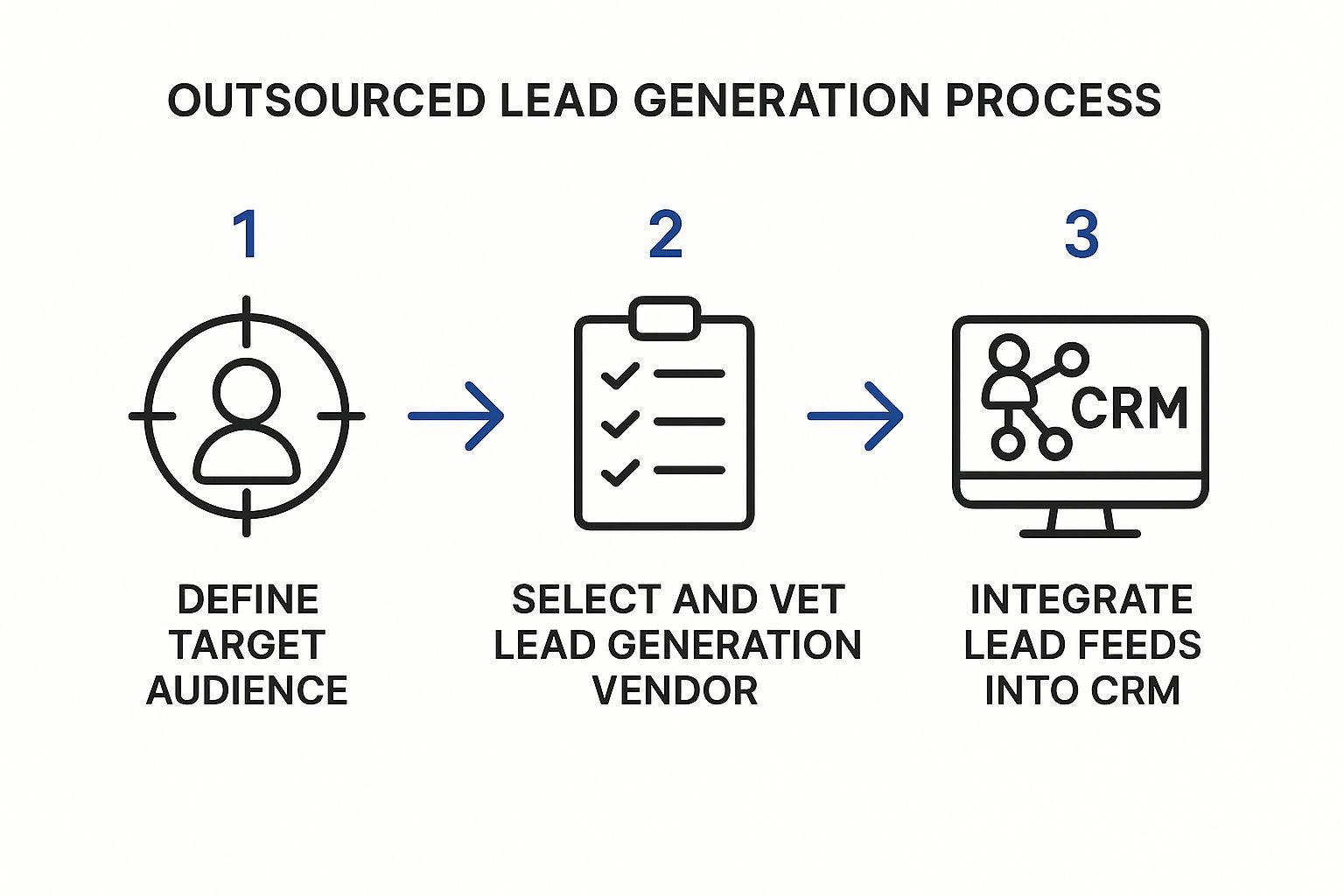
As you can see, success starts with getting the foundations right—clear targeting and smart vendor selection—long before any technical work begins.
Step 1: Strategic Discovery and Alignment
The whole process kicks off with a deep dive into your business. The agency needs to get under the skin of what you do, who you compete with, and where you want to go. This isn't just a box-ticking exercise; it's where the seeds of the entire strategy are sown.
Your job here is to be an open book. The more you share about past wins, roadblocks, and what success looks like to you, the better the agency can tailor the campaign. This phase is all about making sure everyone is on the same page and pulling in the same direction.
Step 2: Blueprinting Your Ideal Customer
With a solid grasp of your business, the next move is to build a detailed Ideal Customer Profile (ICP). This is essentially a data-driven blueprint of the perfect company you want as a client. We’re talking specifics: industry, company size, revenue, and even the exact job titles of the people who make the buying decisions.
Once the ICP is nailed down, the agency will use specialist tools and databases to build a hyper-targeted list of prospects. This meticulous list-building is the bedrock of the entire campaign. It ensures that every single message lands in front of someone who actually matters.
Step 3: Crafting and Executing the Outreach
Now for the creative part. The agency’s copywriters and strategists get to work developing outreach campaigns that demand attention, typically using a mix of channels. This isn't about random spamming; it's a carefully orchestrated sequence that might include:
- Personalised Emails: Messages written to speak directly to the pain points and challenges of your ideal customer.
- Strategic LinkedIn Engagement: Connecting with and messaging key decision-makers on the world's biggest professional network.
- Targeted Calls: Well-timed phone calls to engage high-value prospects and secure those crucial first meetings.
Even with all the automation available today, the human element is what makes the difference. Data quality can be a real challenge – often, less than 25% of genuine leads can be found just by scraping social networks. Top UK agencies get around this by combining technology with skilled sales professionals for telemarketing and appointment setting. You can dig into more outsourced sales provider statistics on llcbuddy.com.
The goal isn’t to just blast messages into the void. It’s to start meaningful conversations. Each channel supports the others, creating a professional and persistent presence that cuts through the noise.
Step 4: Qualifying Leads and Managing the Handover
As replies start flowing in, the agency’s team gets to work qualifying each and every lead. They’ll nurture that initial spark of interest, field early questions, and figure out who is genuinely ready to talk business. Only when a lead meets the pre-agreed "sales-ready" criteria are they passed over to your in-house team.
This handover needs to be seamless, and that’s where reporting comes in. You’ll get clear, straightforward reports on all the key metrics, so you can track progress and see the direct impact the campaign is having on your sales pipeline. This final step closes the loop, turning outsourced effort into real, measurable growth for your business.
How to Choose the Right UK Lead Generation Partner
Picking an outsourced lead generation partner is easily the most critical decision you'll make in this entire process. Think of it less like hiring a supplier and more like bringing on a strategic partner who will have a direct hand in shaping your sales pipeline. Get it right, and you can supercharge your growth. Get it wrong, and you'll burn through time, money, and morale.
It's easy to get fixated on price, but that’s a rookie mistake. A cheap service that delivers a steady stream of duds isn't a bargain; it's a false economy. Instead, you need to dig deeper and evaluate potential partners based on a few core areas that truly signal their capabilities and whether they're the right fit for your business. A thorough vetting process is your best defence—it protects your investment and lays the groundwork for a fruitful, long-term relationship.
Scrutinise Their Industry Expertise
First things first: what do they know about your world? An agency that lives and breathes SaaS will have a completely different playbook from one that specialises in, say, manufacturing. Don't be dazzled by a long list of flashy logos; what you're looking for is specific, relevant experience.
Ask to see case studies from companies that look like yours—similar in size, industry, and ambition. A top-tier partner won't just show you vanity metrics. They'll be able to prove they genuinely understand your ideal customer's pain points, the language they use, and what triggers them to buy. That kind of deep-seated expertise is what elevates generic outreach into conversations that actually go somewhere.
The real value of an experienced partner is their pre-existing knowledge. They've already learned the lessons, know what works in your niche, and can deploy proven strategies from day one, saving you months of trial and error.
Evaluate Their Process and Technology
Here, transparency is everything. A good potential partner should be able to walk you through their entire workflow without hesitation. How do they build their lists? Where do they source their data? What's their outreach methodology? Are they a one-trick pony, or do they use a multi-channel approach that blends email, LinkedIn, and good old-fashioned phone calls?
It’s also worth peeking under the bonnet at their tech stack. What tools are they using for data enrichment, campaign automation, and performance analytics? Understanding their operational setup gives you confidence that they can execute efficiently and provide you with clear, accurate reporting. To get a better feel for what top-tier firms offer, it's a good idea to research the best lead providers and see how they operate.
Prioritise a Data-Driven Approach
The UK market is sophisticated—flying blind and hoping for the best just doesn’t cut it anymore. Smart companies are now often running pilot campaigns to test an agency's performance before signing a long-term contract. It's a fantastic way to validate their claims with real-world data.
You want to find an agency that not only accepts this but actively embraces a data-driven mindset. They should be keen to set clear KPIs from the outset, be completely open about performance, and constantly use data to tweak and improve their strategy. This is the kind of collaborative, evidence-based partnership that leads to sustainable success. For a different perspective on vetting partners, our guide on choosing recruitment outsourcing companies shares a similar evaluation framework.
Vendor Evaluation Checklist
To help you structure your conversations with potential partners, we've put together a checklist of key questions. Use this to guide your evaluation and compare agencies on a like-for-like basis.
This checklist isn't exhaustive, but it provides a solid foundation for a meaningful conversation. The goal is to move beyond the sales pitch and understand how they actually operate, ensuring you find a partner truly aligned with your business goals.
Tracking the Metrics That Actually Matter
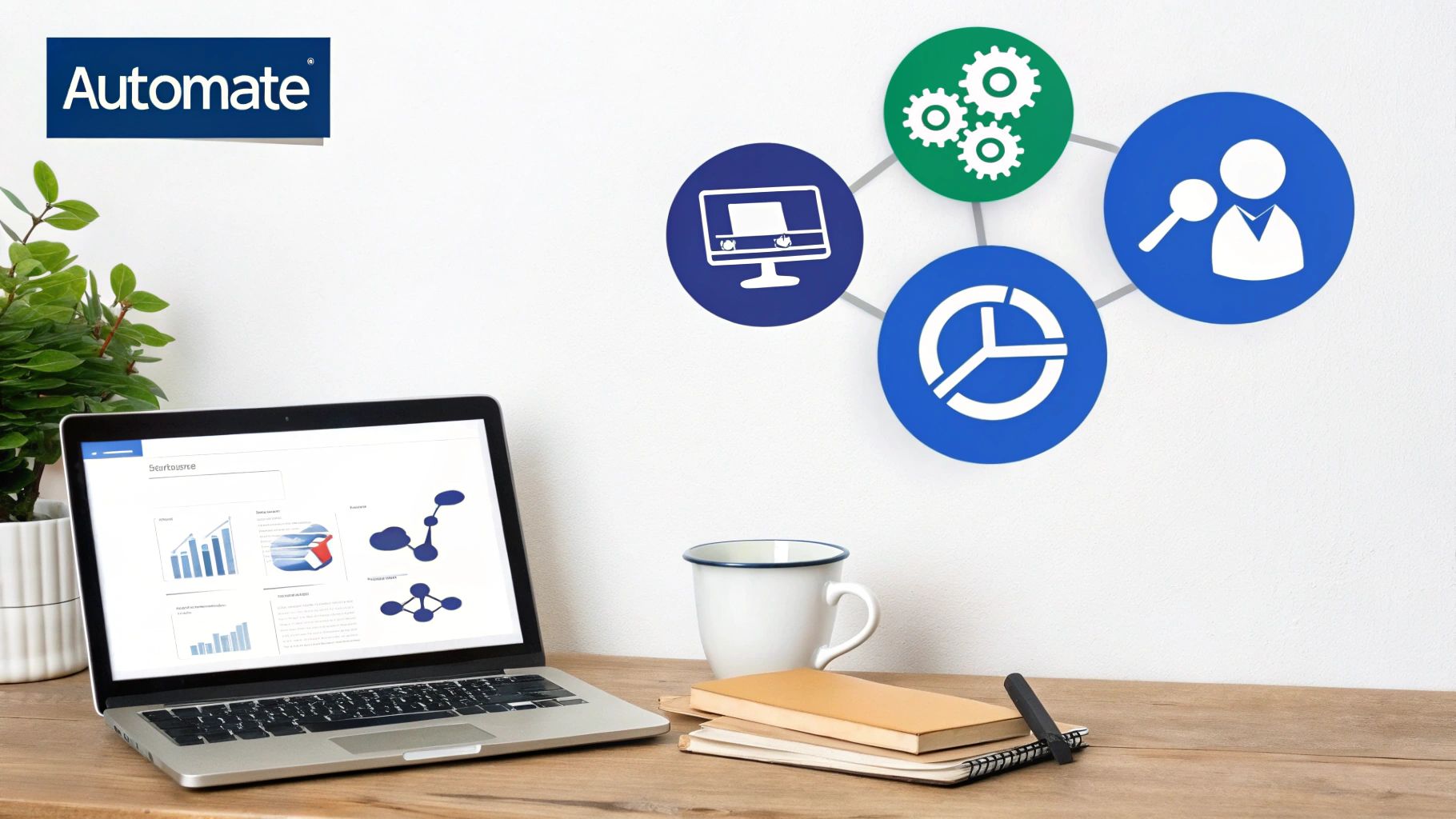
When you're running an outsourced lead generation campaign, it's all about the data. Guesswork won't get you very far. It’s easy to get distracted by flashy but ultimately hollow numbers, like email open rates. These are often called "vanity metrics" because while they look good on a report, they don't tell you the real story about your return on investment.
To really know if your partnership is working, you need to dig deeper. The whole point is to draw a straight line from your agency’s efforts to actual pipeline growth. This means focusing on the key performance indicators (KPIs) that directly impact your bottom line and show whether your investment is paying off.
Core KPIs for Your Outsourced Partnership
To get a clear, honest picture of performance, you only need to concentrate on a handful of powerful metrics. Think of each one as a different lens for viewing the health of your sales pipeline and the effectiveness of your agency partnership.
Here are the essential numbers you should have on your dashboard:
- Sales Qualified Leads (SQLs): This is the big one. It’s the total number of leads passed over by your agency that your own sales team agrees are genuinely ready for a sales conversation. This is your primary measure of lead quality.
- Cost Per Lead (CPL): A simple but crucial efficiency metric. It tells you exactly how much you're spending to get each lead in the door. Just divide your total campaign spend by the number of leads generated.
- Lead-to-Opportunity Conversion Rate: This tells you what percentage of those leads actually progress to become a real sales opportunity in your pipeline. It’s a fantastic indicator of both lead quality and how well your sales team is aligned with the agency.
Tracking these figures takes you beyond simply counting activities and starts to paint a picture of real commercial momentum. This data-first approach is a cornerstone of modern business, and for those curious, understanding how to measure success in other areas like outsourcing IT services offers some interesting parallels.
The most important question your metrics should answer is this: "Are we generating high-quality conversations at a cost that makes sense for our business?" If you can say yes, you know the partnership is working.
From Lead Generation to Customer Acquisition
While the metrics above are great for tracking the top of the funnel, the ultimate prize is winning new customers. This is where the final, most important KPIs come in, tying your lead generation efforts directly to revenue.
Cost Per Acquisition (CPA) is the real bottom line. It reveals precisely how much you had to spend to win each new customer through the campaign. To calculate it, divide the total campaign cost by the number of new customers you closed. A low CPA is the hallmark of a hugely profitable partnership.
Of course, tracking these numbers is only half the battle. Your agency can bring you fantastic leads, but they still need to be converted. Exploring proven strategies for effective lead follow-up can make a massive difference here, helping your team turn those promising leads into signed deals. By focusing on these business-critical metrics, you can confidently measure the true ROI of your partnership.
Got Questions About Outsourcing Lead Generation? We’ve Got Answers.
Thinking about bringing in an outside team for lead generation is a big move, and it's smart to have questions. We get it. Below, we've tackled the most common queries we hear from business leaders across the UK, giving you straight, practical answers to help you decide if it's the right step for your company.
How Much Should We Budget for Outsourced Lead Generation in the UK?
There’s no single price tag, as the cost for outsourced lead generation in the UK really depends on who you partner with, how complex your campaign is, and the industry you're in. Generally, you'll come across three main pricing models.
Most agencies work on a monthly retainer, which can be anywhere from £2,000 to £6,000+. Some offer a pay-per-lead model, where you only pay for prospects that meet your criteria. Others use a hybrid approach – a smaller retainer topped up with bonuses for hitting specific targets.
But here’s a word of advice: don't just look at the price. The real value is in the return on your investment. A cheap service that sends you a stream of poor-quality leads will cost you far more in wasted sales time and missed opportunities. Always ask for a crystal-clear proposal that breaks down every cost and tells you exactly what you’re getting for your money.
How Long Before We Actually See Results?
This is the big one, isn't it? You'll see activity—emails going out, calls being made—within a few weeks. But a steady, reliable flow of quality leads? That usually takes about 90 days to build up properly.
Think of it like this: the first month is all about laying the groundwork. Your new partner will be digging deep into your business, building your target list, and getting the tech ready. In month two, they'll launch the campaign and start gathering real-world data on what’s working. By the third month, the whole process should be a well-oiled machine, delivering predictable results for your sales team to run with.
A word of caution: be wary of any agency promising the world overnight. Great B2B lead generation isn't a quick fix. It's about building momentum that lasts, creating a pipeline that you can rely on for the long haul.
Can an Agency Really Understand Our Niche Business?
A brilliant and absolutely essential question, especially if you're in a specialised field. The best agencies don't just take a quick brief and run with it. They have a thorough, detailed onboarding process designed to get right under the skin of your company, your product, and your ideal customer.
Many of the most effective partners actually specialise in specific sectors, whether that's SaaS, manufacturing, or financial services. When you’re talking to potential agencies, don't be shy. Ask them directly about their experience in your world and ask to see case studies from similar businesses. A true partner will put in the time upfront to make sure every message and every target is perfectly tuned to the unique rhythm of your market.
What’s Expected of Me in This Kind of Partnership?
Your role is absolutely vital. You're not just hiring a supplier; you're creating a partnership. While the agency handles the heavy lifting of the day-to-day campaign, your input is what makes it all work.
Here’s what you’ll need to focus on:
- Sharing What You Know: Be completely open during the discovery phase. The more your agency knows, the better they can perform.
- Giving Quick Feedback: When they send over messaging or a batch of leads for review, your timely thoughts are crucial for keeping things on track.
- Making Sure Sales is Ready: Your sales team needs to be prepped and ready to jump on the qualified leads as soon as they come in.
A simple weekly check-in is usually all it takes to keep everything aligned. This regular contact ensures the campaign adapts as your business does and makes the whole collaboration feel seamless.

